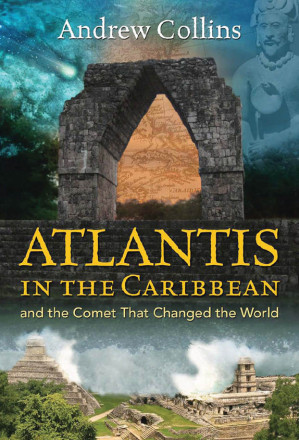English [en], .epub, 🚀/zlib, 5.4MB, 📗 Book (unknown)
Atlantis in the Caribbean : And the Comet That Changed the World 🔍
Inner Traditions/Bear & Company, 3rd Edition, New Edition of Gateway to Atlantis, FR, 2016
Andrew Collins 🔍
description
An in-depth investigation of the mounting evidence that Atlantis was located in the Bahamas and Caribbean, near Cuba in particular • Explains how Atlantis was destroyed by a comet, the same comet that formed the mysterious Carolina Bays • Reveals evidence of complex urban ruins off the coasts of Cuba and the Bahamas • Shows how pre-Columbian mariners visited the Caribbean and brought back stories of Atlantis’s destruction • Compares Plato’s account with ancient legends from the indigenous people of North and South America, such as the Maya, the Quiché, and the Yuchi of Oklahoma The legend of Atlantis is one of the most intriguing mysteries of all time. Disproving many well-known Atlantis theories and providing a new hypothesis, the evidence for which continues to build, Andrew Collins shows that what Plato recounts is the memory of a major cataclysm at the end of the last Ice Age 13,000 years ago, when a comet devastated the island of Cuba and submerged part of the Bahaman landmass in the Caribbean. He parallels Plato’s account with corroborating ancient myths and legends from the indigenous people of North and South America, such as the Maya of Mesoamerica, the Quiché of Peru, the Yuchi of Oklahoma, the islanders of the Antilles, and the native peoples of Brazil. The author explains how the comet that destroyed Atlantis in the Caribbean was the same comet that formed the mysterious and numerous elliptical depressions, known as the Carolina Bays, found across the mid-Atlantic United States. He reveals evidence of sunken ruins off the coasts of both Cuba and the Bahamas, ancient complexes spanning more than 10 acres that clearly suggest urban development and meticulously planned road systems. Revealing the identity of Plato’s “opposite continent” as ancient America, Collins argues that Plato’s story was first carried back to the Mediterranean world by trans-Atlantic mariners, such as the Phoenicians and Carthaginians, as early as the first millennium BC. He offers additional ancient trans-Atlantis trade evidence from Egyptian mummies, Roman shipwrecks in the Western Atlantic, and the African features of giant stone heads in Mexico. Piecing together the final days of Atlantis and the wildfires, earthquakes, tsunamis, days of darkness, and advancement of ice sheets that followed the ancient comet’s impact, Collins establishes not only that Atlantis did indeed exist but also that remnants of it survive today, most obviously in Cuba, Atlantis’s original central island.
Alternative author
Collins, Andrew
Alternative publisher
Inner Traditions Bear And Comp
Alternative publisher
Bear Cub Books
Alternative edition
United States, United States of America
Alternative edition
Simon & Schuster, [N.p.], 2016
Alternative edition
Third edition, Rochester, 2016
Alternative edition
Rochester, Vermont, 2016
Alternative edition
3rd ed, Rochester, 2016
Alternative description
Noted author Andrew Collins provides evidence that at the end of the last Ice Age 13,000 years ago, a comet devastated the island of Cuba and submerged part of the Bahaman landmass destroying the Caribbean Atlantis. He further identifies Plato's ""opposite continent"" as none other than ancient America
date open sourced
2024-08-15
🚀 Fast downloads
Become a member to support the long-term preservation of books, papers, and more. To show our gratitude for your support, you get fast downloads. ❤️
If you donate this month, you get double the number of fast downloads.
- Option #1: Fast Partner Server #1 (recommended) (open in viewer) (no redirect) (short filename) (no browser verification or waitlists)
- Option #2: Fast Partner Server #2 (open in viewer) (no redirect) (short filename)
- Option #3: Fast Partner Server #3 (open in viewer) (no redirect) (short filename)
- Option #4: Fast Partner Server #4 (open in viewer) (no redirect) (short filename)
- Option #5: Fast Partner Server #5 (open in viewer) (no redirect) (short filename)
🐢 Slow downloads
From trusted partners. More information in the FAQ. (might require browser verification — unlimited downloads!)
- Option #1: Slow Partner Server #1 (slightly faster but with waitlist)
- Option #2: Slow Partner Server #2 (slightly faster but with waitlist)
- Option #3: Slow Partner Server #3 (no waitlist, but can be very slow)
- After downloading: Open in our viewer
External downloads
All download options have the same file, and should be safe to use. That said, always be cautious when downloading files from the internet, especially from sites external to Anna’s Archive. For example, be sure to keep your devices updated.
-
For large files, we recommend using a download manager to prevent interruptions.
Recommended download managers: JDownloader -
You will need an ebook or PDF reader to open the file, depending on the file format.
Recommended ebook readers: Anna’s Archive online viewer, ReadEra, and Calibre -
Use online tools to convert between formats.
Recommended conversion tools: CloudConvert -
You can send both PDF and EPUB files to your Kindle or Kobo eReader.
Recommended tools: Amazon‘s “Send to Kindle” and djazz‘s “Send to Kobo/Kindle” -
Support authors and libraries
✍️ If you like this and can afford it, consider buying the original, or supporting the authors directly.
📚 If this is available at your local library, consider borrowing it for free there.
Total downloads:
A “file MD5” is a hash that gets computed from the file contents, and is reasonably unique based on that content. All shadow libraries that we have indexed on here primarily use MD5s to identify files.
A file might appear in multiple shadow libraries. For information about the various datasets that we have compiled, see the Datasets page.
For information about this particular file, check out its JSON file. Live/debug JSON version. Live/debug page.
